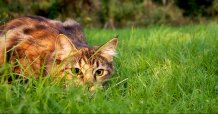Articles

Credit Jennifer Barnard
Roaming cats prey on their owners’ minds
Many cat owners worry about their pets wandering the streets, but perceive cats hunting mice and birds to be unavoidable instinct, researchers at the University of Exeter have found.
Owners often dislike their feline companions’ compulsion to catch wildlife but feel unable, or unwilling, to control it.
The researchers interviewed cat owners about their pets’ roaming and hunting behaviour, what worried them, and what they felt responsible for.
Hunting, and the resulting corpses on the kitchen floor, were seen as natural behaviour outside owners’ control. Those who did want to limit hunting felt this was difficult to achieve without locking cats indoors – and hardly any owners wanted this.
“We found a spectrum of views on hunting, from owners who see it as positive for pest control to those who were deeply concerned about its consequences for wild animal populations,” said lead author Dr Sarah Crowley, of the Environment and Sustainability Institute on the University of Exeter’s Penryn Campus in Cornwall.
“However, because hunting is a natural cat behaviour, few owners believed they could effectively control this without negatively affecting their cats’ welfare.”
Cats vary in the amount they hunt, with some catching multiple birds and small mammals every week, while many others stay indoors or rarely lift a predatory paw.
With up to 11 million cats in the UK, some conservationists are nevertheless concerned about the effect even a minority of hunting cats might have on wildlife, especially declining species like house sparrows.
Current methods of preventing cats catching wild prey include fitting them with collars with bells and bright colours, and keeping them indoors at night.
“Cat owners understandably make their pets’ health and well-being a priority, and many feel that cats need free access to the outdoors,” said Professor Robbie McDonald, head of Exeter’s Wildlife Science group, who is leading the research.
“At the same time, having such independent pets creates extra anxieties for owners about both their cats’ safety while ranging free, and their impacts on wildlife.
“We are working closely with cat owners and cat welfare organisations. Our aim is to find practical ways of reducing hunting, while enhancing cat health and welfare.”
The researchers interviewed 48 cat owners from urban, suburban and rural areas in Cornwall and Oxfordshire.
Sponsorship for the study comes from the independent bird conservation charity SongBird Survival and is overseen by an advisory group comprising veterinarians, cat behaviour and welfare experts, and representatives from SongBird Survival, International Cat Care and the RSPCA.
“We are very concerned about the significant adverse impacts that free-ranging domestic cats can have on our songbirds and other wildlife,” said Robert Middleditch, SongBird Survival’s Chairman.
“We are therefore delighted to have commissioned this important project, and believe that working with cat owners to find practical solutions, while promoting responsible pet ownership, can benefit both vulnerable wildlife and cats.”
Sam Watson, RSPCA cat welfare expert, said: “This is valuable work which helps us to understand pet owners’ sense of responsibility towards their cats and any potential impact they could have on wildlife.
“While there is still lots of debate as to whether cats have detrimental effects on wild bird populations, on an individual level predation attempts by cats are likely to cause considerable suffering, so we would welcome any practical solutions which would help to avoid this.
“We hope further study can help find ways to reduce the impact that cats may have on wildlife whilst also maintaining and boosting the welfare of our cats.”
The paper, published in the journal People and Nature, is entitled: “Hunting behaviour in domestic cats: an exploratory study of risk and responsibility among cat owners.”
Date: 8 January 2019
